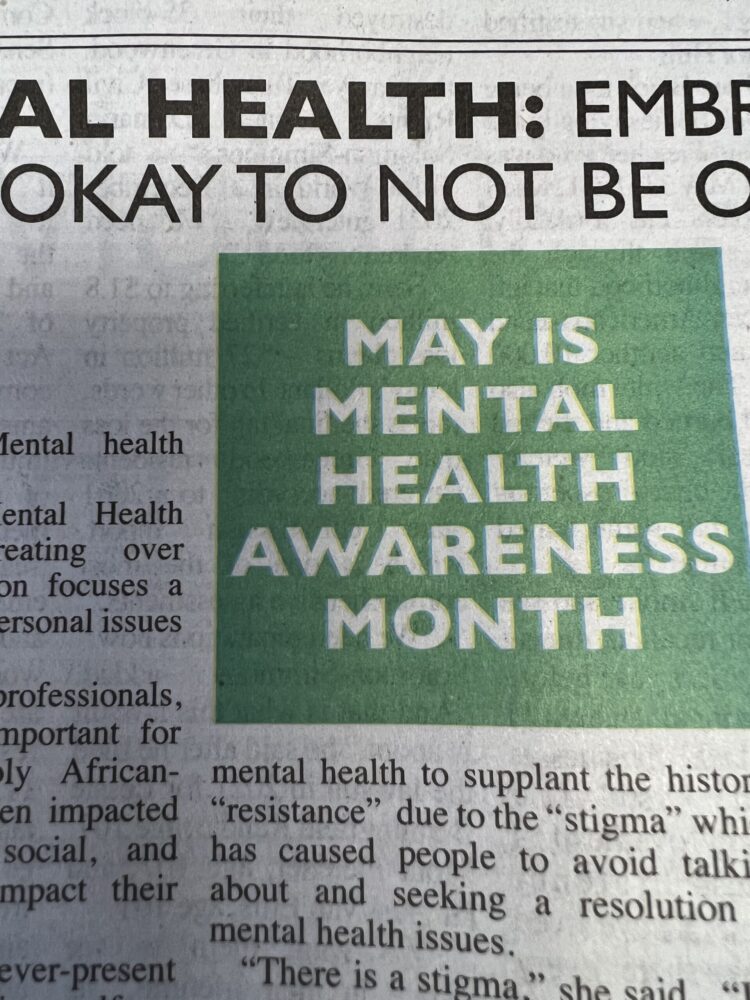National Commentary
Mental Health: “It’s okay to not to be okay” era

By Leonard E. Colvin
Chief Reporter
New Journal and Guide
May is National Mental health Awareness Month.
July is Minority Mental Health Awareness Month, creating over 60 days when the nation focuses a spotlight on policy and personal issues related to mental health.
For many health care professionals, this space of time is important for people of color, notably African Americans, who have been impacted by historic economic, social, and personal forces which impact their lives each day.
Gun violence, ever-present responsibilities of feeding self or family, social biases historically and, the last two years, the COVID-19 Pandemic are some of the key forces.
Dr. Ernestine Duncan is Chair and Professor of Norfolk State University’s Department Psychology. This is the largest academic unit within NSU’s College of Liberal Arts with over 500 student majors, seven faculty, and administrative staff.
Duncan noted she hopes we are entering a new era of talking about mental health to supplant the historic “resistance” due to the “stigma” which has caused people to avoid talking about and seeking a resolution to mental health issues.
“There is a stigma,” she said. “It is not exclusive to African Americans who think culturally it is a sign of weakness to display or even talk about mental health issues.”
Duncan admits that African Americans are not a “monolith” due to our different personal geographic, family, educational, and economic circumstances.
“But we have a shared and collective experience of being Black in America, historically,” she said. “We have experiences of oppression, racism, discrimination.”
Duncan said that instead of seeking traditional professional mental health therapy, African Americans have developed different approaches.
“African Americans have always had other resources, to cope,” she said. “We use our families, our friends, and our church.”
Apart from the stigma, access to viable mental health care is complicated with 11 percent- plus African Americans not having any healthcare insurance.
A primary care physician could refer a patient to a mental health specialist. But mental healthcare coverage by the nation’s
private and public insurance industry “is even less”, she said, than a traditional coverage.
She said even when it is secured, mental health care plans, unless they are provided by the Veterans Administration, (VA), limit the number of visits for patients with specialists.
Also, she said that the level of paperwork navigating the bureaucracy also deters healthcare specialists from even providing it.
“Even when we have insurance we wait so long that it then needs emergency care,” she said.
Duncan said that despite the shared racial and cultural aspects of Black life in America, all groups experience the top four mental health issues: Anxiety, Depression, Stress, and emotional Burnout.
Duncan said stress, placed on humans, is a reaction to daily financial and personal pressures and responsibilities and is a key factor in fostering mental health issues.
According to research, it not only impacts us detrimentally emotionally, but physically as well in the form of hypertension and various other cardiovascular ills.
COVID-19 over the past two years has added another layer of “stress” triggers.
African Americans make up roughly 13 percent of the nation’s population, Duncan said, but a much larger share of people who were infected, and died during the height of the pandemic.
“People could not afford not to work,” she said. “They were aware of the risk of being infected. Many people lived in multi-general homes and feared infecting loved ones, especially the elderly.”
“We were locked down with our children who could not attend school,” she said. “The kids had nothing to do and could not keep up academically because of the lack of adequate internet service.”
“We also lost our ability culturally to ritualize, especially for loved ones’ funerals,” she said. “We felt isolated and that had an impact on us emotionally.”
Duncan said that studies in Atlanta and Washington, D.C. indicate that African Americans may have a biological resilience to adapt to stress.
The studies indicate there are colored or pigmented cells in the brains of people of African Ancestry which have built up via DNA overthe decades to establish some biological resilience to stressors.
Duncan is tasked with not only training the next generation who are people of color and other groups, but bolstering the skills of professionals currently in the varied healthcare field.
According to Duncan, NSU and other schools are seeking to elevate the number of health care professionals to improve portals and options for mental health treatment for people of color of all income levels.
Expanding the number of minority health care professionals, especially African Americans who are sympathetic to the cultural and social history of Black people is important.
“I see that more people are willing to talk about the issue of mental health,” said Dr. Duncan. “This is bringing more attention and discussion and that is good.
Duncan said that Simeon Biles put her mental health issue on display during the 2020 Olympic games. She ceased competing for a while because she said she was “(feeling) the weight of the world on (her) shoulders.” Biles felt affected by the pressure of the Olympics. She said she was experiencing “the twisties”, a psychological phenomenon causing a gymnast to lose air awareness while performing.
Duncan said that incident and others displayed by celebrities have ushered in the “It’s ok to not to be ok” era of confronting mental health issues.














